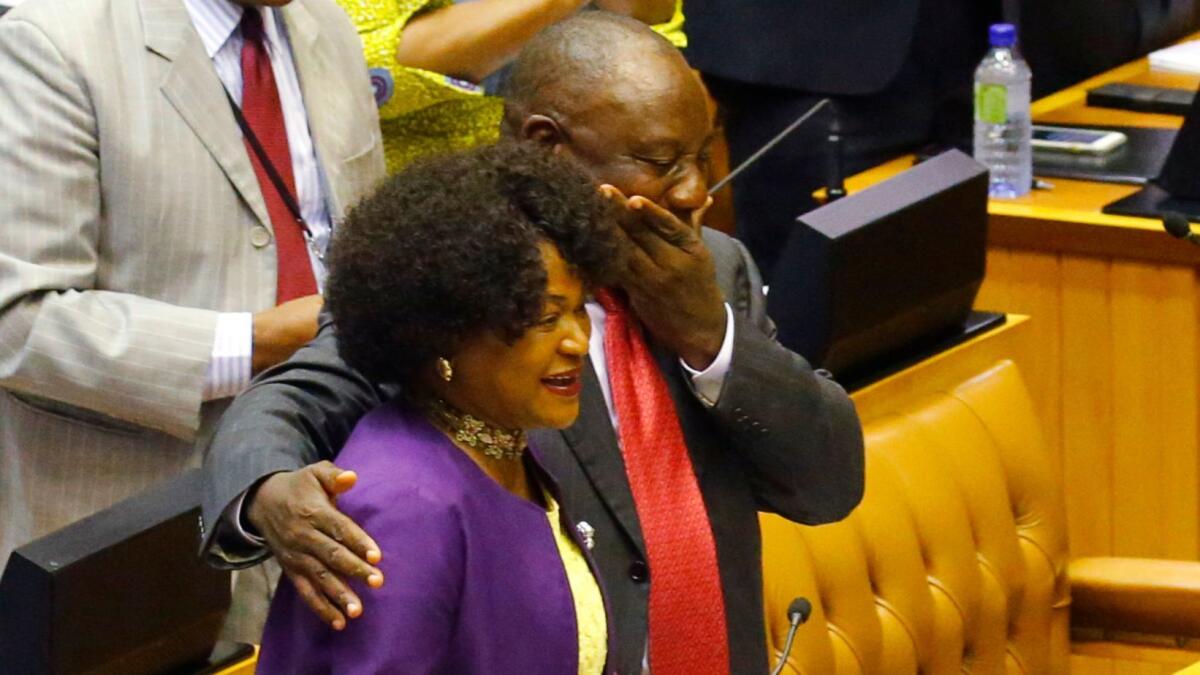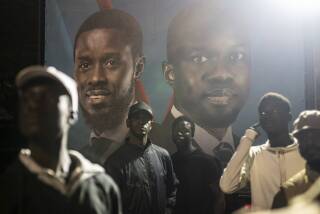Cyril Ramaphosa sworn in as South Africa’s president, replacing Jacob Zuma

Millionaire ex-businessman Cyril Ramaphosa, sworn into office as South Africa’s new president Thursday evening, comes to power facing the same entrenched problems that have stumped the governing African National Congress in nearly 24 years in power: gaping inequality, failing education and health systems and enduring unemployment.
Ramaphosa told Parliament he intended to address corruption and strengthen South Africa’s state-owned enterprises. He also vowed to work to improve the lives of South Africans.
“What we have always said is that we will improve the lives of our people on an ongoing basis, and that is what we have been doing since 1994. The lives of our people have been improving on an ongoing basis. All of us should work to improve the lives of our people and take their lives to a higher level,” he told opposition parties in Parliament.
“South Africa must come first in everything that we all do,” he said, adding he would do his best not to disappoint his countrymen.
He was sworn into office at an evening ceremony at the presidential office in Cape Town several hours after being elected president in Parliament, as the candidate of the majority ANC party.
The biggest immediate challenge for Ramaphosa is to rebuild the ANC’s waning electoral support before elections due next year by convincing jaded voters that a party in power since 1994 will be more competent and responsive in the future.
He inherits the task of unraveling the web of patronage and corruption that spread in the party and the government during former President Jacob Zuma’s term — without alienating too many powerful beneficiaries in the party. He has to resurrect South Africa’s ailing state-owned enterprises, such as South African Airways and the electricity provider Eskom, saddled with debt and requiring successive hefty bailouts from the treasury.
Nominating Ramaphosa in Parliament for the presidency Thursday, ANC lawmaker Patrick Maesola called him a revolutionary figure. Business and foreign investors see him as anything but revolutionary — stable, reliable and business-friendly.
As president, Ramaphosa must bridge seemingly incompatible ideas — implementing the party’s “radical economic transformation” policy, including land seizures with no compensation, and also encouraging investment.
The growing strength of South Africa’s currency, the rand, in the hours since Zuma’s departure Wednesday night suggests the business community is confident Ramaphosa will avoid the controversial measure of taking land without compensation, even if that is party policy. The rand Thursday reached its highest point in nearly three years.
In Zimbabwe, land seizures, initially popular, caused the collapse of agriculture and plunged the country’s economy into a prolonged crisis.
Ramaphosa is a former union official who abandoned politics in the 1990s after he failed in his ambition to succeed Nelson Mandela and become the second black president.
Instead, he went into business and used his connections as a political insider to make his fortune in mining, banking, insurance, fast food and other businesses. Forbes estimated his fortune at around $450 million in 2015.
The son of a policeman, Ramaphosa was born in Soweto and gained a law degree before joining the union movement. He became secretary-general of the ANC in 1991.
As a unionist in the 1990s he helped negotiate an end to apartheid and played a key role in drafting South Africa’s constitution.
Ramaphosa’s most intractable challenge is unemployment, which is about 27%. The figure is considered conservative and does not include the many people who have given up looking for a job. Analysts say about 67% of young people aged 18 to 24 are jobless.
The country’s growth has been too sluggish to provide jobs, particularly for unskilled young people who leave South Africa’s struggling government schools ill-equipped for the work force. The International Monetary Fund has predicted growth of just 0.07% in 2018.
Ramaphosa has said that by creating a sense of energy, renewal and a commitment to clean up corruption, he will restore investor confidence. He told reporters last month he had returned from the World Economic Forum in Davos, Switzerland, with many promises of investment.
He has promised to grow the economy, increase black ownership of companies and financial institutions, and create a million jobs in the next five years.
In a sign that he can be tone-deaf about his country’s poverty, Ramaphosa, a keen game farmer, bid around $2.1 million on a buffalo cow at auction in 2012, but was outbid. He later apologized for making the bid “in a sea of poverty,” but admitted the move had been damaging.
Ramaphosa was attacked for the auction bid by Julius Malema, leader of the opposition Economic Freedom Fighters — who also faulted him for his role on the board of platinum mining company Lonmin. In August 2012, 34 people, mostly striking Lonmin miners, were killed when police opened fire on them.
A commission of inquiry found later that Lonmin did not engage adequately with its employees nor try to protect them from harm.
Ramaphosa’s role in the crisis was controversial because he contacted the police minister and mining minister requesting more police be sent to handle the crisis. In an email to a Lonmin colleague, he said the strikers “are plainly and dastardly criminal and must be characterized as such,” extraordinary language for a former union official.
Ramaphosa later apologized for the language he used, but said he was trying to prevent further deaths after the killings of 10 workers. The commission of inquiry later found his call for more police to control the Lonmin situation did not contribute to the massacre of striking workers by police.
Ramaphosa has also been criticized, along with other members of Jacob Zuma’s Cabinet, of being complicit in the failures of the Zuma years.
“The ANC’s new top six‚ including its new president‚ are complicit directly or indirectly in the corruption and capture of the state through their own actions or lack of action,” an opposition leader and former ANC member Mosiuoa Lekota, leader of the Congress of the People, said Thursday.
South Africans — and the international investor community — will be watching to see if Ramaphosa fires controversial ministers who were closely associated with Zuma, including finance minister Malusi Gigaba, energy minister David Mahlobo, mineral resources minister Mosebenzi Zwane and social development minister Bathabile Dlamini.
Zuma is criticized for allowing his friends the Guptas, a powerful business family, too much influence in government affairs, including the hiring and firing of ministers. Zuma’s son, Duduzane Zuma, was in business with the Guptas.
On Wednesday, the Hawks, a special police unit that fights high-profile crimes, arrested eight people associated with a dairy project in the Free State that was allegedly used to siphon millions of dollars to Gupta family interests.
Among those who appeared in court Thursday over the project was a member of the family, Varun Gupta. The Hawks announced Thursday that an arrest warrant had been issued for another family member, Ajay Gupta.
Some have questioned why the Hawks did not act earlier on allegations in 2016 by a deputy finance minister and an ANC lawmaker that they were offered Cabinet jobs and inducements by members of the Gupta family in return for advancing the family’s business interests. The Guptas have denied any wrongdoing and claim attacks on them are political.
Critics of the Zuma era will be eyeing Ramaphosa to see if his anti-corruption drive becomes a means to oust his political enemies, or if he takes action to restore the independence of the Hawks and prosecuting authority.
UPDATES:
11:40 a.m.: This article was updated with more information about Ramaphosa’s background and challenges.
7:15 a.m.: This article was updated throughout with staff reporting.
This article was originally published at 5:15 a.m.
More to Read
Start your day right
Sign up for Essential California for news, features and recommendations from the L.A. Times and beyond in your inbox six days a week.
You may occasionally receive promotional content from the Los Angeles Times.






